Imagine pulling your favorite hardbound tome from your shelves. It’s late, and you curl up, a blanket across your legs and a warm mug of something steaming on a table to your side. You open the book, eager to see how the story within plays out. But this book takes on a life of its own. Each time you open it, events play out differently and you’re never quite sure how things will end. As you read on, page by page, even though you’ve done this dozens of times already you can’t help but feel the pull as the story drags you in once more.
We’ve heard promises of replayability in games like these before, but never perhaps quite like this. Pendragon is the newest title from inkle, a studio known for its heavily narrative games. In each case prior that I’ve reviewed, both 80 Days and Heaven’s Vault, I’ve been taken off guard by just how solid the writing was. How enthralled I became in the tales unfolding despite relatively simple gameplay. Recently, in thinking about this title, a saying from a math teacher I once had got stuck in my head: it takes 3 points to graph a straight line. Don’t ask me why it popped into my mind. The idea is that if you plot only two points you won’t be sure if that line, that trend you’re drawing, is accurate. With a third point, though, you can confirm that trend continues in the direction you’re seeing. What we have here in Pendragon is inkle’s third point on the graph, and I’m sure any fan of their prior work is eager to see if the trend they’ve set still holds.
But to combine inkle’s signature stance on story with a tactics-style, grid-based combat system? It’s a bold move that I’ve never seen attempted. This is either going to get really interesting or end up as a confusing mess.
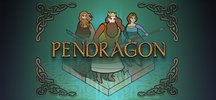 Pendragon
Pendragon
Developer: inkle Ltd
Publisher: inkle Ltd
Platforms: PC, Apple OS X
Price: $16.99
Copy Provided By Publisher
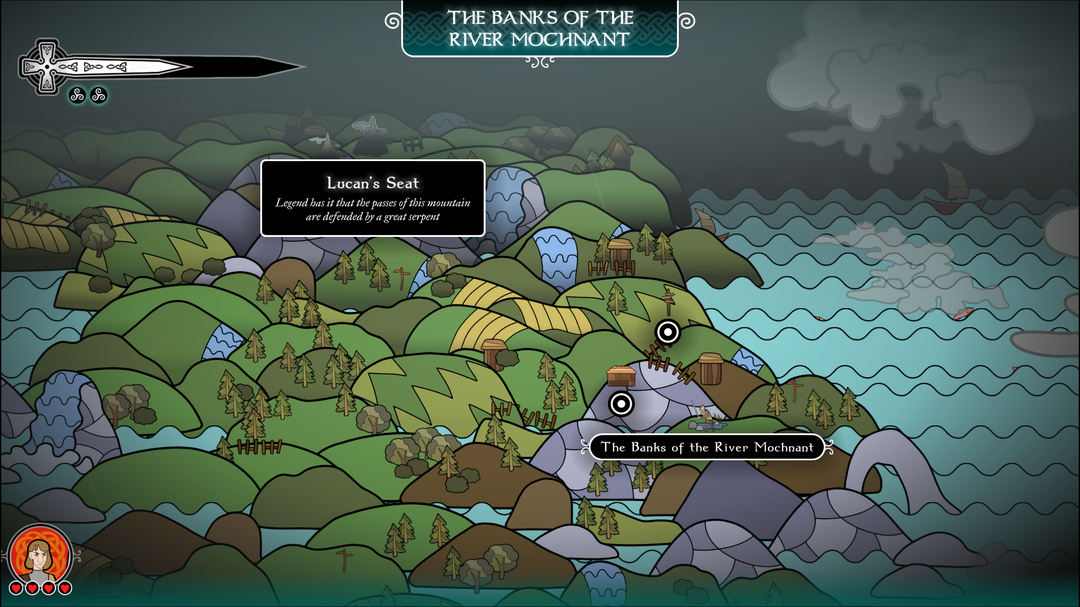
A whole map filled with adventure! New locations appear every game, and their positions are never the same.
The Prologue
Pendragon tells the tale of a post-Camelot Arthurian legend. Mordred has shattered the Round Table, many of the knights are scattered to the far corners of England, and darkness is falling across the land. Alone, somewhere to the North, Arthur rides for Mordred’s army, a desperate attempt to right the slips that have gone so wrong. Perhaps he is just seeking to die alone. Elsewhere your choice of starting character, either an aged Guinevere or regretful Lancelot, starts their quest to locate Arthur and help him in some way. One last push to do good in a world of evil. Along the way they may meet others willing to help, along with all sorts of dangers, and maybe, just maybe, they will arrive with a small army so Arthur can push forward to his final confrontation with Mordred. And perhaps more than that. Maybe they can give hope back to a land with none.
You’re not limited to these starting characters, of course. As you journey you will unlock more hidden characters. Some are stock commoners and knights with randomly generated names, adding some freshness each time one appears. Others are more major characters from Arthurian legend. Did you manage to find where Merlyn disappeared? He’ll be playable from the start in future runs. Perhaps you’d like to see how Morgana le Fay ends this tale, that is, if your group can trust her. I’m still trying to figure out where Gawain got off to! The tale of Sir Gawain and the Green Knight happens to be one of my favorites.
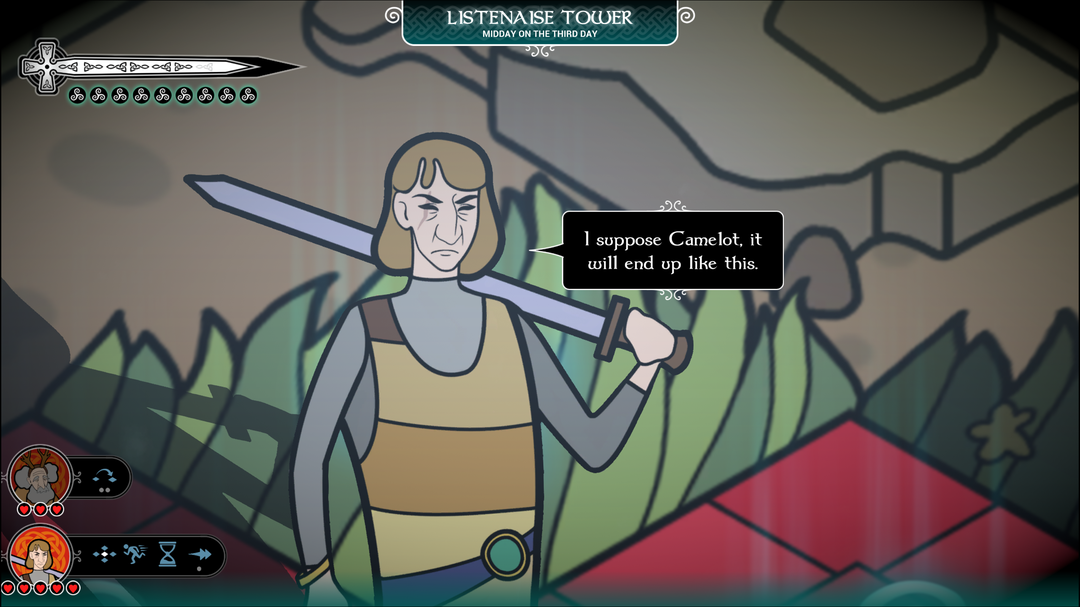
The storybook look is given even more flair with well-timed close ups.
When The Plot Thickens
It would be an understatement to say that inkle has nailed its narrative story beat again with Pendragon. This game is full of so much heart, from the sweep of French horns and lilt of oboes in the soundtrack, to the sound effects adding atmosphere in crumbled castles and dense forests, to the conversations between characters as they journey across the rolling hills. I also love the paper cutout art style, making the game feel even more like a storybook. But perhaps more than all of that, inkle has masterfully imbedded their narrative within the grid-based tactics combat. Fights themselves are deadly and quick, a single hit taking down either an enemy or one of your characters. Positioning may be everything, but ultimately it’s so much more than just attack and defense.
If you move in an orthogonal direction, your character will assume an attack pose and can take out enemies on the board. If, however, you move diagonally your character cannot attack, instead influencing more spaces for your team, helping you move them more easily on your next turn, and your character will take a non-threatening pose. The catch here? Characters will converse with each other mid-match while you play on the board. When encountering others who may be hesitant to fight, choosing to move into a non-hostile stance, perhaps talking your way past adversaries as you move for the exit tile, becomes a very real thing. Sure you could fight, and you could beeline for the exit, leaving your foes behind, but if you’re especially diplomatic you may even sway a follower to your cause. Do you stay behind, moving back and forth with your opponent to keep the conversation going? Of course, this may involve riskier moves. Remember that you can be felled in a single hit. Do you chance a talkative move past a villager who might as soon gut you for your coin purse as ride to assist Arthur?
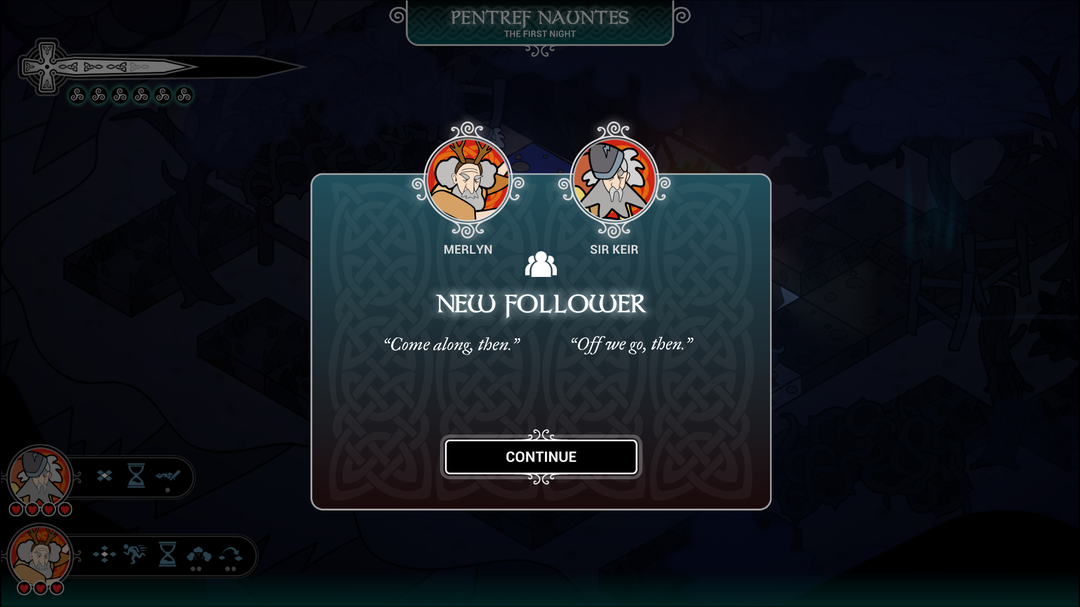
My personal favorite group to date: team Old Dudes. Yeah, you're never too old to save the kingdom!
In just a few quick board moves, you’ll discover this game goes from a pure strategy tactics game to a blend of clever positioning, deadly attacks, and witty conversations. Allies and enemies alike may drop new map locations for you to explore, but every turn you stay in combat is a turn you potentially risk injury or even death. The longer you play defensively, the more a morale meter drops. Should it reach zero, your party will flee. If a character took a wound and fell in combat, perhaps your party can save them, but if morale is especially low, they might just die outright or be left behind. This is just one subtle way among many that Pendragon bends the narrative in new and engaging ways each time you play it.
Remember the time Guinevere made it to Arthur’s side only to be cut down by a careless step, causing Arthur to go into a blind rage and butcher his way to Mordred? How about the time Sir Lancelot was too kind to some angry villagers and fell to a random ax to the back of his head? Or the time the last proper knight of the group, leading two commoners in his cause, fell to bears in the woods and those villagers alone carried the quest all the way to crossing swords with Sir Mordred himself? These are just a few of the possible stories your game might tell, all the while never dropping that atmospheric attachment to the characters you’ve come to love and the quests they’ve struggled through. Perhaps the pen really is mightier than the sword. At least with Pendragon you’ll use both in equal measure.
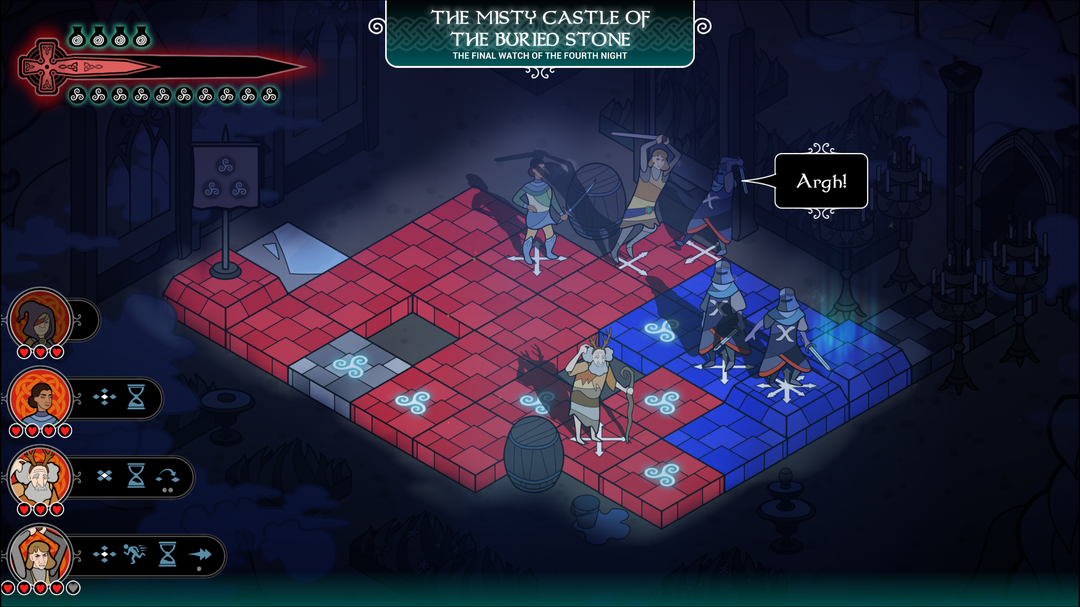
Encounters are truly like illustrations out of a book!
The Real Deal
I’ll be honest with you. I’ve studied a bit of Arthurian legend in my day. In addition to being something I loved as a kid, I took some college courses on the literature as well. The truth in the telling of stories about King Arthur, his knights, and the court of Camelot is that the telling changes drastically depending on the storyteller. Some tales have no action at all, waxing poetic about love and attraction within the court. Others have next to no down time, being action packed novels with battle after battle. Some tell moral tales of quests and character, while others abound with chivalry and knightly tournaments. Various authors have run the gamut when it comes to these legends, so what form does Pendragon choose to take?
Actually it’s bit of all of them and tastefully so. I’ve found reference dialogue to support a view of endless trysts in Camelot’s court just as I’ve seen my journey take the shape of a tale of redemption or a hack-and-slash adventure of glory. The game so creatively blends all these aspects of Arthurian legend together that I have to believe some of the writing staff have spent no small amount of time themselves reading Arthurian literature. There’s a single reference I came across to a term that was coined less than 100 years ago, but it refers to something that’s dated back centuries, so I’m willing to let that slide. Ultimately it’s not immersion breaking. In fact, it’s really refreshing to see this world brought to life in such a faithful way, never losing its own unique sense of identity in the narrative it layers.
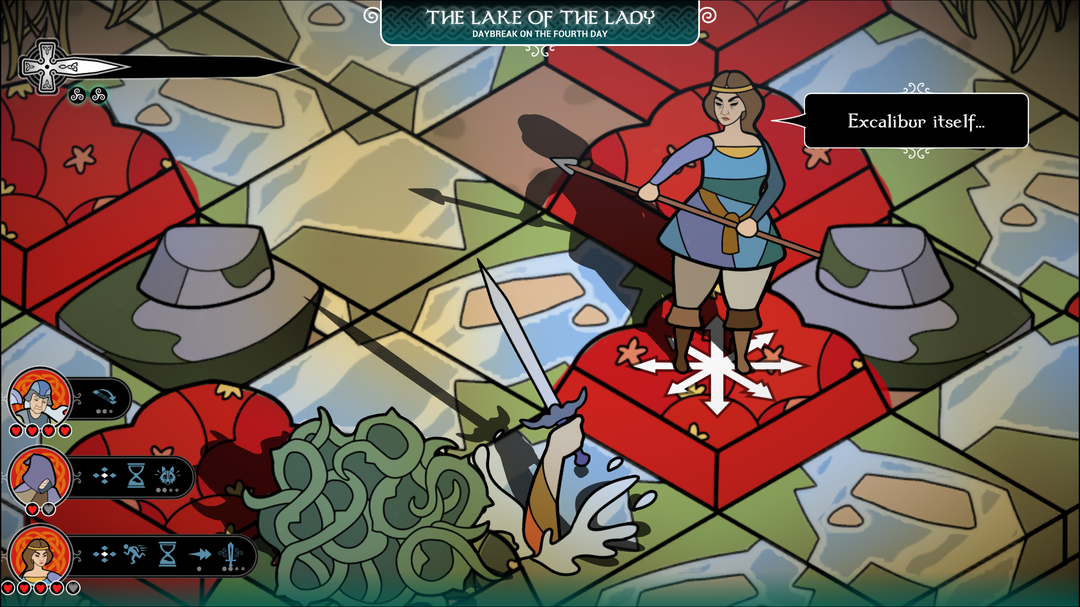
While I've rushed straight to the final battle in as little as a couple days in game, taking extra time to explore can yield its own benefits.
Tell Us The Story Again
So how does the game hold up on multiple play throughs? And what will hardcore fans of tactics-style games think of the gameplay? Very valid questions and ones I went in with myself.
Let’s start with the replayability which is, in fact, fantastic. You wouldn’t think for a game as simple as this and that plays in about an hour a run, typically limited by a finite number of pre-scripted encounters, that you’d get as much variety as you do. Typical inkle, as I’m learning. They jam pack their games with far more narrative than I still seem to give them credit for at the outset. Characters feel alive. You’re just as likely to make a group of bandits run as you are to kill them all in combat. If you spare them by sneaking around, they might even join you, perplexed by your kindness. Hopeless conflicts can still be won when you remember that NPCs behave like real people. As a rule of thumb, if you think you can do something, you probably can. The developers have been very clever in how they layer options on top of options, which when combined with the RNG of the game make for some truly amazing moments. To date, among all the characters I’ve tried, I’ve played at least 6 runs with Lancelot. They’ve all been novel.
As for the tactics element, this is perhaps where my caution to potential buyers comes in. If you’re approaching this game purely for its tactics combat, you will find it a bit lacking. The combat, grid system, and narrative are inextricably linked, so coming to this game purely for the combat will likely leave you feeling unfulfilled and disappointed. This isn’t XCOM or Into the Breach, so keep that in mind. For example, sometimes the right move is the cinematic one, sacrificing a character in a chess-like exchange that wins you the conflict. After all, if you win and that wasn't their last health point, you can help them up, right? You can win before your morale hits zero, right? If you like the sound of a narrative that’s intertwined with the grid-based system, you should be fine. In fact I encourage you to check it out as I’ve not ever seen this kind of blended gameplay before.
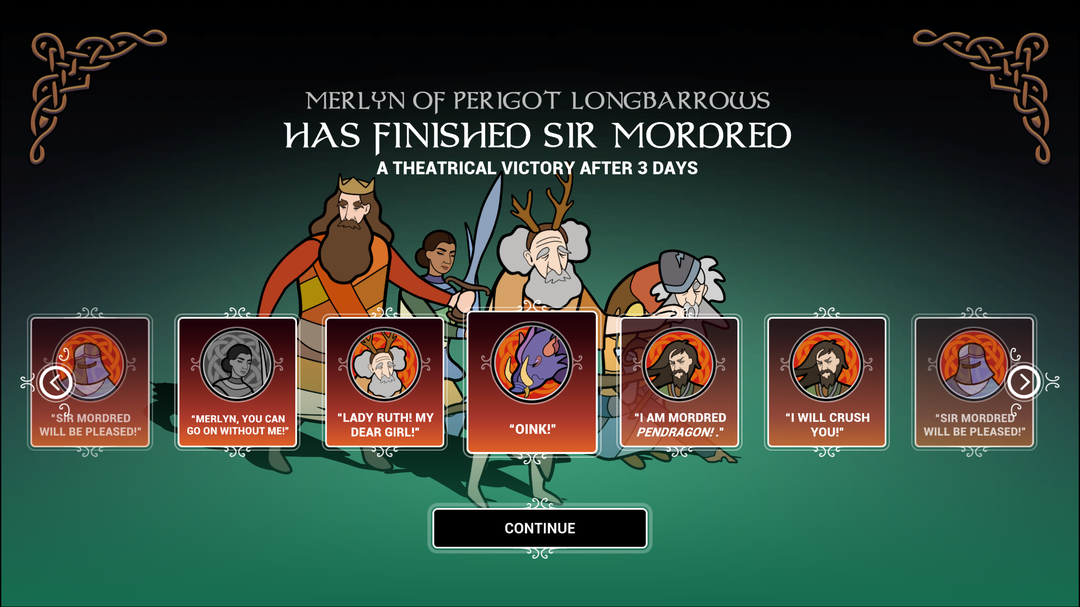
After a story, you get a recap where you can see all the epic highs and terrible lows of your tale.
There are also, of note, several possible bugs I’ve encountered with the game. I say “possible” because while I’m fairly certain they were bugs, my only clue was a slightly broken sense of immersion. Losing a character on the encounter directly before meeting another recruitable one seemed to bug my game, unable to trigger the needed dialogue and repeating instead the same downtrodden line over and over. Then again, it was possible my clue was to attack the other character rather than avoid them as I did. Similarly, reaching Mordred with a common villager presented me with an unwinnable fight. Attacks that should’ve been possible (at least to my understanding of legal moves within the combat system) simply wouldn’t allow me to attack. It’s possible that fight was a “supposed to lose” encounter which would make sense given that no villager should be able to best Sir Mordred in 1-on-1 combat. But it could’ve just as equally been a bug. Fights that are “supposed to lose” usually have a certain suddenness to them as if to say, “you never had a chance.” My fight was just 10 minutes of endless circling before I gave up and let Mordred kill me. A frustrating end to an epic story I’d grown attached to.
And yet none of these bugs was ever game breaking. In the writing of this article, the game has been updated at least 4 times. It’s entirely possible by the time you try the game yourself, the issues I experienced will also be a thing of legend. And even when they happen, the most jarring thing I suffered each time was being taken out of the immersive narrative. Something of a cardinal sin for an inkle game, but at the same time a relatively minor moment in the overall journey.
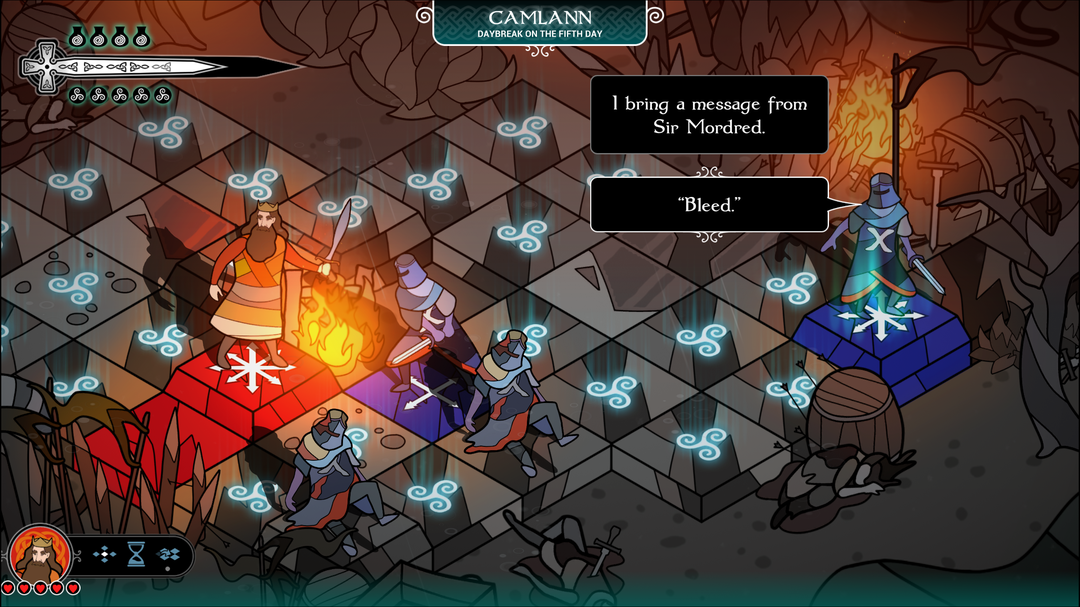
A journey with hardship and humor alike!
Epilogue
Minor bugs aside, this game is a thrill to play every time I start up a story. The overland map and its interest points will change every run. NPCs will be different each time, ensuring that just because you see a particular person more than once you may not reach the same outcomes with them. Location grids will change, ensuring even more freshness each time you battle. And of course, the twisting narrative, masterfully woven, will have its own slot machine of random triggers going off. Whenever you open this story book you can never quite be sure what will happen.
I’ve played probably close to a dozen games and I still regularly find encounters I’ve never seen before. There are also several hidden characters I have yet to unlock. Even if there are super secret, extra good endings I have yet to find, what I get here is a classic case of “it’s the journey that matters, not the destination.” And at roughly 1 hour per game, it’s a journey I look forward to taking over and over again. In my opinion, inkle’s done it again. If you’ve enjoyed their prior work, are interested in narrative games, or are hooked by the telling of Arthurian legend stories in charming artwork and sound, you really should give this game a try. As indie studios go, inkle continues to push the boundaries of what narrative games can do, and Pendragon creates a legend of its own that will continue to live on.